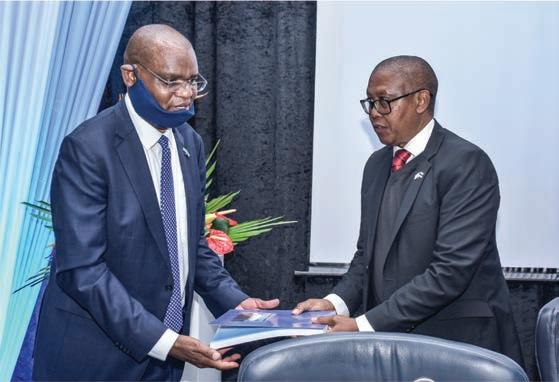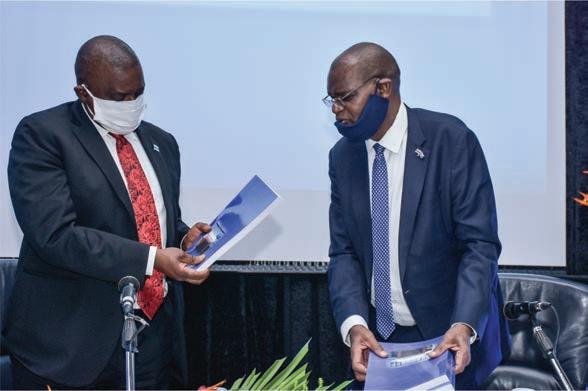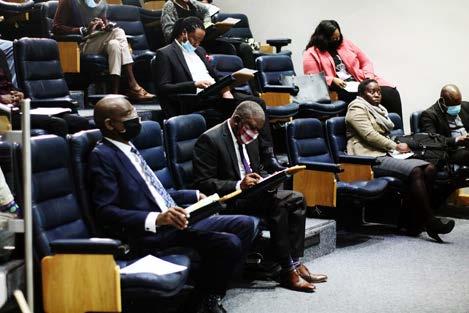
7 minute read
2020 Bank of Botswana Economic Briefings
from BANKNOTES
As a tradition, following the publication of the Bank’s 2019 Annual Report, the Bank conducted the 2020 economic briefings for stakeholders. However, due to COVID-19 disruptions, this year’s briefings were only limited to two stakeholder communities.
The first briefing was for His Excellency the President, Dr Mokgweetsi E. K. Masisi and Cabinet Ministers, which was held on June 23, 2020 and the second was for Media Representatives, held on July 14, 2020. In both briefings the Governor delivered opening remarks followed by various presenters and closed with question and answer session.
Advertisement
These economic briefings provide the Bank with an opportunity to share a comprehensive analysis and assessment of the country’s economic performance and outlook through an analysis and assessment of key economic indicators. Stakeholders were briefed on the Bank’s operations and performance in 2019, performance of the Botswana economy in 2019, as well as highlights of the theme chapter of the 2019 Annual Report titled “Central Bank Governance and Functions in Pursuit of Price and Financial Stability”.

BoB Governor, Moses Pelaelo and Deputy Governor, Dr Kealeboga Masalila during question and answer session during Economic Briefing for the Media

Left to right - Deputy Governors Dr kealeboga Masalila, Mr Andrew Motsomi and General Counsel Ms Ewetse Rakhudu protocoling Cabinet during the Economic Briefing for Cabinet.

Bank’s Operations and Performance in 2019
The Bank was reported to have performed better in 2019, with a net income of P6.9 billion compared to P2.9 billion recorded in 2018. The banking industry was reported to be sound, solvent, liquid and profitable, with the banking sector’s total assets increasing from P91.3 billion in December 2018 to P98.7 billion at December 31, 2019.
Performance of the Botswana Economy in 2019
slowed in 2019, with Real GDP growth of 3 percent, compared to a faster expansion of 4.5 percent in 2018. The lower increase in output was attributable to contraction in mining output and deceleration in output growth of the non-mining sector. Mining output contracted by 3.9 percent in 2019, compared to a growth of 7.6 percent in 2018, mainly due to weaker performance of the diamond, soda ash, copper and coal subsectors. In 2019, overall global demand for rough diamonds was adversely affected by the trade tension between the US and China, as well as mass protests in Hong Kong. Copper output contracted by 100 percent

OFFICIAL NEWSLETTER OF THE BANK OF BOTSWANA Issue 3 | Volume 2 | November 2020


His Excellency the President Dr Mokgweetsi Masisi with Minster of Finance and Economic Development Hon. Dr. Thapelo Matsheka and Bank of Botswana Governor during the Question And Session of the Economic Briefing for Cabinet

BoB Governor Moses Pelaelo handing over the 2019 Annual Report to the Minister of Finance and Economic Development Hon. Dr Thapelo Matsheka COVID-19 Registration Protocols - Bank’s health officials registering Minister of Basic Education Hon. Fidelis Molao His Excellency the President Dr Mokgweetsi Masisi receiving the 2019 Annual Report from Governor Pelaelo during the Cabinet Economic Briefing.



following cessation of production at the Mowana Mine in November 2018. Coal output decreased due to lower demand at Morupule B power station, which was operating below capacity, with one of the units placed under care and maintenance in the third quarter of 2019.
The Ministry of Finance and Economic Development had projected real GDP to contract by 8.9 percent in 2020, largely due to the anticipated negative impact of containment measures against COVID-19, before rebounding to 7.7 percent in 2021. The decline was attributed to a sharp contraction in major sectors such as mining; trade, hotels and restaurants; manufacturing; social and personal services; and transport and communications. Meanwhile, the IMF had forecast the domestic economy to contract by 9.6 percent in 2020 on account of lower demand for diamonds before rebounding to 8.6 percent in 2021.
With regard to inflation, domestic inflation was below the objective range of 3 – 6 percent for most of 2019 and was 2.2 percent in December 2019. The low inflation reflected base effects associated with the increase in administered prices in 2018, particularly fuel prices. On account of a positive medium-term inflation outlook, the Bank Rate was reduced by 25 basis points to 4.75 percent in August 2019, the first policy change since October 2017, and has been maintained thereafter. However, inflation was forecast to revert to within the objective range in the third quarter of 2021.
The Theme Chapter of the 2019 Annual Report “Central Bank Governance and Functions in Pursuit of Price and Financial Stability”


His Excellency the President Dr Mokgweetsi Masisi receiving the 2019 Annual Report from Governor Pelaelo during the Cabinet Economic Briefing. BoB Governor Moses Pelaelo, and Deputy Governor Andrew Motsomi, with Media practitioners during the Economic Briefing for the Media



The theme chapter aimed at enhancing public education around the role of the central bank and its responsibility on contribution towards the national objective of sustainable economic activity and stability. The chapter also highlighted emerging areas that require adaptation of central bank operations in order to remain aligned with market and technology developments and, therefore, continue to be effective in the discharge of its mandates.
Among the key messages from the theme chapter was that the central bank mandate continues to focus on the public good of protecting and preserving the value and integrity of the national currency in the interest of overall macroeconomic stability and a balanced, sustainable economic growth for the country. The elements include; conduct of monetary policy where the objective is to ensure that inflation is low, stable and predictable; currency management to ensure uninterrupted availability of good quality banknotes and coin; anchoring the external value of the currency through contributions towards exchange rate policy management and implementation, as well as management of the foreign exchange reserves; supervision of banks and oversight of the payments system to contribute to financial stability; and related inter-agency collaboration and coordination.
Furthermore, it was evident from literature and practice across jurisdictions that central bank autonomy and related accountability attributes of transparency and consistency promote credibility and effectiveness of the institution in discharging its mandates. This is important for Botswana in relation to sustained macroeconomic stability and effective role of the Bank in the transformation agenda to improve economic diversification, inclusive growth and the transition to high income status. Thus, the proposed revisions to the Bank of Botswana Act to entrench clarity and ranking of objectives and assignment of responsibilities, and improve governance and institutional arrangements and relationships.
Regarding emerging developments and Fintech, the theme chapter reinforces the need for a facilitative policy posture and alignment of central bank operations with technology developments. Related thereto, at the national level, is adoption of digital identification formats to complement financial inclusion efforts. For the Bank of Botswana in particular, there is need to prepare for transition to digital currencies and to harness technology with respect to payments and regulatory processes, and communication.
In his concluding remarks for both economic briefings the Governor committed that the Bank would remain fully aligned to the long-term economic objectives of the country, committed to contributing to macroeconomic stability, financial sector development and, also, financial inclusion to support broad-based economic activity. The Bank will also rededicate efforts to judiciously manage the nation’s foreign exchange reserves through the revised Reserves Management Policies and Investment Guidelines. The envisaged modernisation of the Bank of Botswana Act and the institutional governance arrangements was expected to help strengthen the Bank’s performance and roles in this regard.



